Physical Address
304 North Cardinal St.
Dorchester Center, MA 02124
Physical Address
304 North Cardinal St.
Dorchester Center, MA 02124
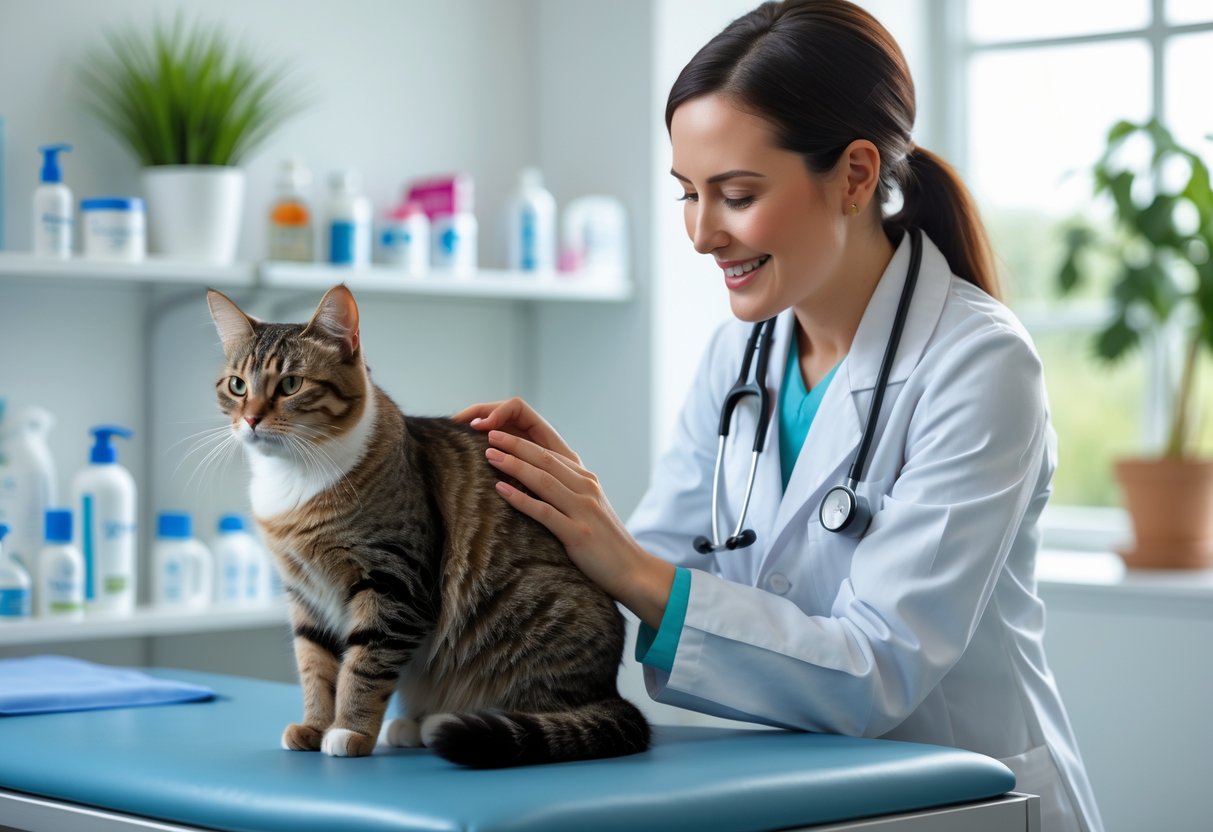
Every cat owner wants their furry friend to stay healthy and energetic. Helping your cat build a strong immune system is one of the best ways to protect them from common illnesses and help them live a longer, happier life. Simple steps like regular exercise, balanced nutrition, and keeping stress low can make a real difference in your cat’s well-being.
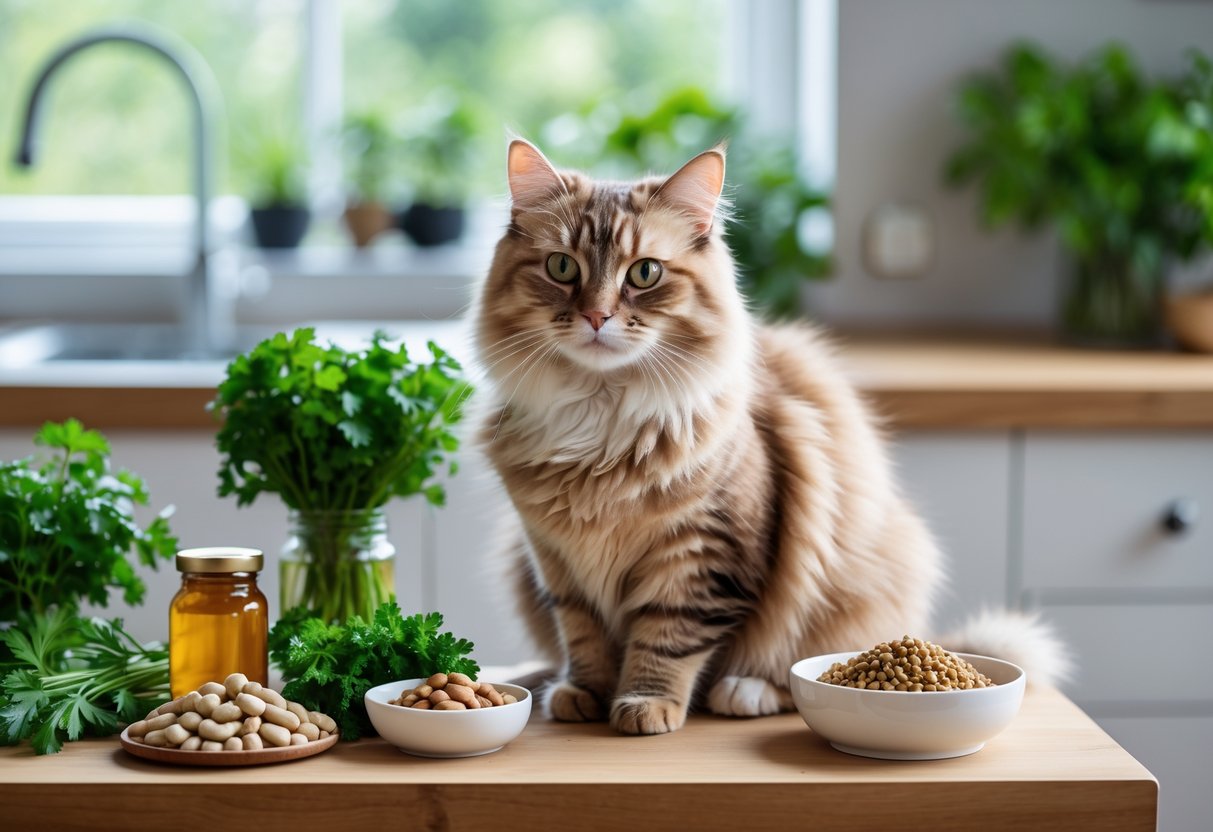
Cats rely on their immune system to fight off germs and stay strong as they age. Healthy daily habits matter—everything from routine vet visits to a clean home supports their natural defenses. Cat parents who pay attention to these needs often notice their pets being more playful, resilient, and quick to recover.
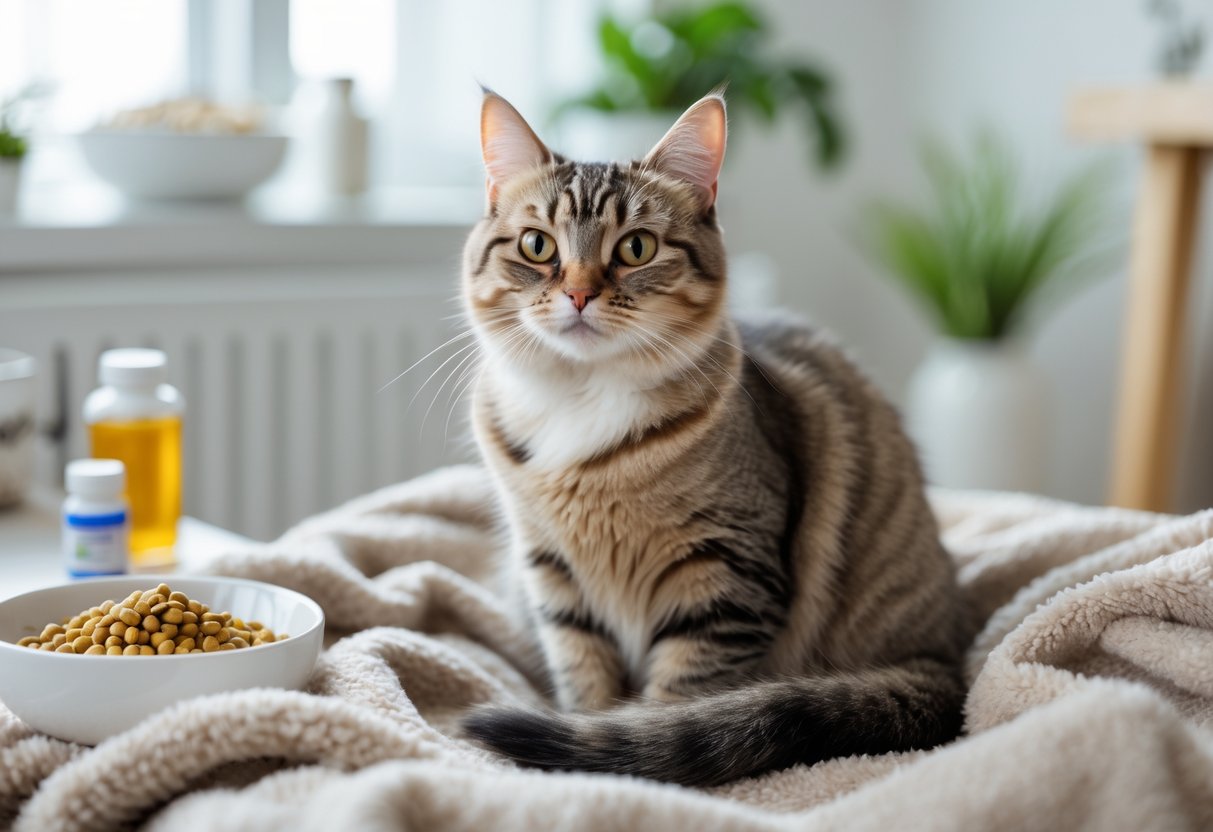
A cat’s immune system is responsible for fighting off infection and disease. When it works well, cats stay healthier and recover from illness more quickly.
The immune system is made up of special cells and chemicals in the blood, lymph nodes, bone marrow, spleen, and other tissues. These parts all work as a defense network. When a virus, bacteria, or parasite enters the body, immune cells target and destroy it.
White blood cells are key: Some attack invaders directly, while others help trigger more complex immune reactions. The immune system also remembers past infections, so it can respond faster if the same threat appears again.
Key Tasks of the Immune System:
A healthy immune system keeps a cat playful, active, and less likely to get sick.
A cat’s immune system can become less effective due to several causes. Poor nutrition is a top concern—cats need quality food with all the right nutrients to stay strong. Stress also has a direct impact and can make a cat more likely to catch illnesses.
Other common causes include:
Cats living with smokers or in homes with dirty litter boxes also have weaker immune systems. Addressing these factors can help build up a cat’s natural defenses. You can read more about cat immune health and common risk factors at How to Boost Your Cat’s Immune System: 8 Vet-Reviewed Tips (https://www.catster.com/cat-health-care/how-to-boost-cats-immune-system/).
Cats with weakened immune systems may get sick more often than usual. Watch for signs like sneezing, coughing, or frequent respiratory infections. Slow healing of wounds and sores that do not get better are also warning signs.
Other possible symptoms to look for:
It’s important to see a vet if you notice these changes. Early help can prevent minor issues from turning serious. More details about what to look out for are listed here: Feline Immune System and Tips to Boost Your Cat’s Immunity (https://www.vet-organics.com/blogs/news/feline-immune-system-how-it-works-and-tips-to-boost-your-cat-s-immunity).
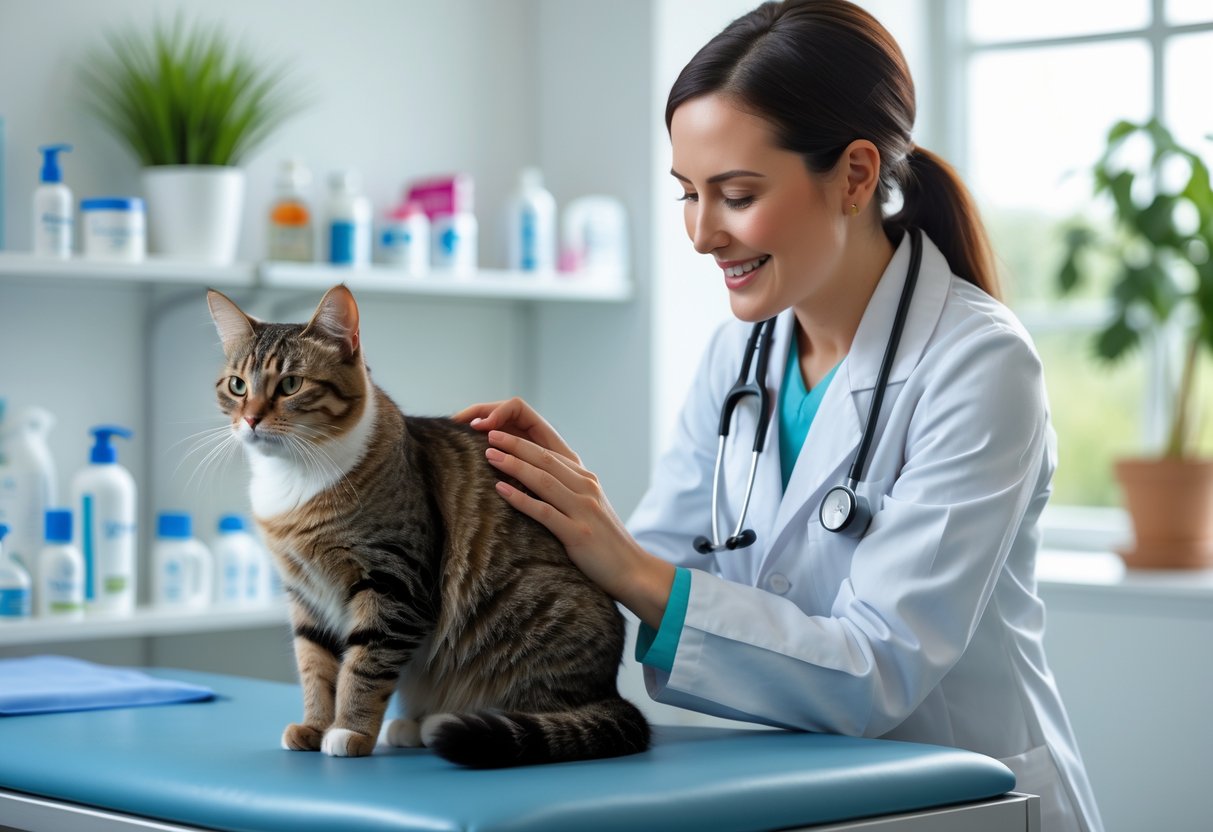
Taking cats to the vet at least once a year helps prevent problems before they get serious. These visits are more than just a check for illness—they are key to keeping cats healthier and happier for longer.
Routine wellness exams let the vet check a cat’s weight, teeth, eyes, ears, and coat for signs of health problems. These exams often include listening to the heart and lungs, checking for lumps or injuries, and asking about changes in behavior or eating habits.
A yearly exam helps vets spot issues like dental disease or weight changes early, before they lead to bigger problems. Cats are good at hiding when they feel sick, so regular exams are important for catching signs that might otherwise go unnoticed. If a cat is older or has ongoing health trouble, the vet might recommend more frequent check-ups.
A complete exam should review any changes in the home environment or diet, which can impact the cat’s well-being. Certain labs may be done as part of the wellness visit to check for kidney disease or diabetes, especially in senior cats. Learn more from this detailed overview on the importance of regular vet check-ups for cats.
Early detection is one of the main benefits of regular vet visits. The vet can find hidden issues, such as early-stage kidney disease or dental problems, that a cat owner may not notice.
Bloodwork, urine tests, and physical exams help spot problems before symptoms show. When diseases are found early, treatment can be started right away. This can mean less pain for the cat and easier recovery. Early prevention also includes looking out for signs of obesity, arthritis, or skin and ear problems.
Regular check-ups help create a health history for the cat. This record makes it simpler to notice small changes over time. Catching problems early can improve the cat’s quality of life and lower the chance of serious illness. More advice on how exams can help can be found in this article on the benefits of regular veterinary check-ups for your cat.
Vaccinations are needed to protect cats from several serious diseases. The vet will keep these vaccines up to date during check-ups, based on the cat’s age, lifestyle, and risk factors.
Some important vaccines include those for rabies, feline distemper, and upper respiratory diseases. Vet visits also include advice on parasite prevention, such as flea and tick control, and deworming for intestinal parasites.
Cats that go outdoors or live with other animals may need extra protection. The vet will tailor a parasite prevention plan to fit each cat’s needs, helping stop problems before they begin. Proper vaccination and parasite control help prevent illness and outbreaks in both cats and the people around them. Read more about the importance of these steps in the cat health care guide on routine vet visits.
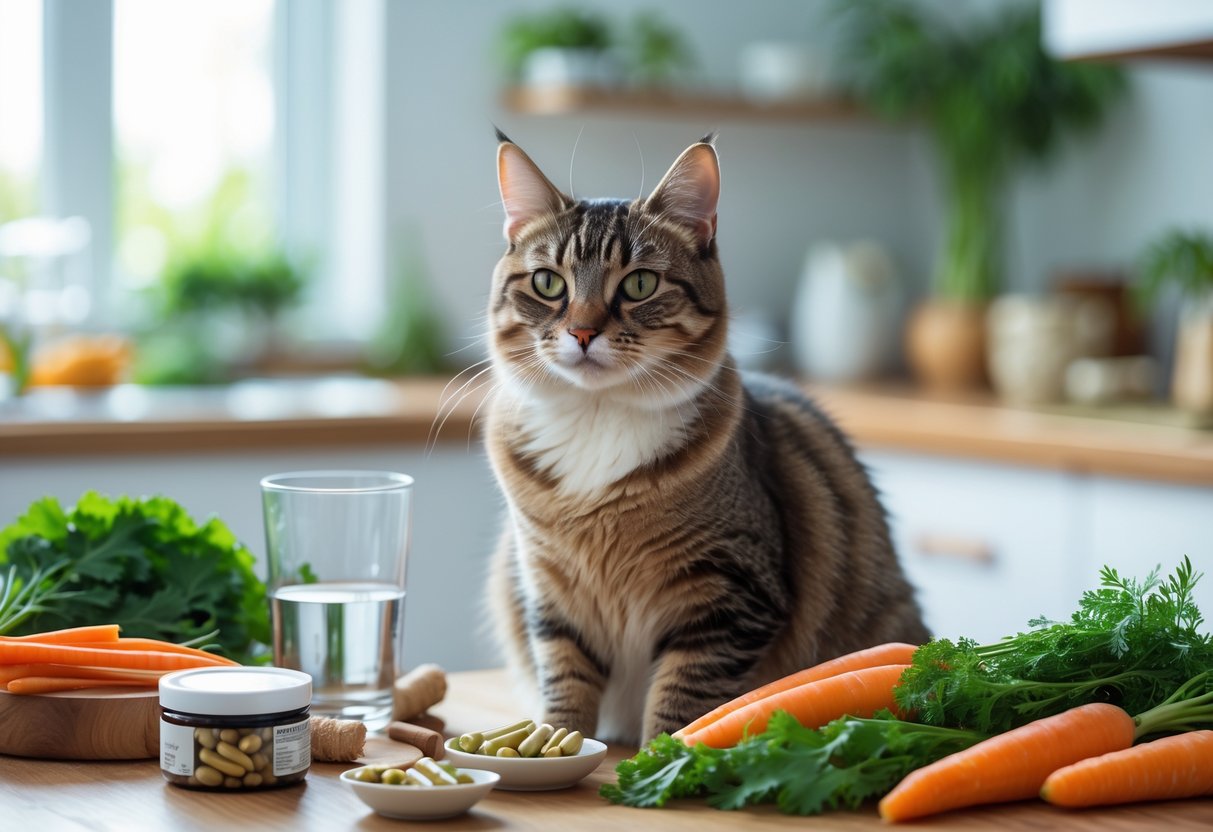
Feeding a cat the right foods helps protect it against illness. Nutritional balance and safe supplements work together to keep a cat’s body strong and resilient in daily life.
A healthy immune system begins with proper nutrition. Cats need a diet rich in animal protein, moderate in fat, and low in carbohydrates because they are obligate carnivores. Look for foods labeled “complete and balanced,” as these meet established standards for vitamins and minerals.
Avoid feeding cats a diet that is mostly fillers, artificial additives, or low-quality by-products. High-quality meats like chicken, turkey, or fish should be listed among the primary ingredients. Fresh protein provides essential amino acids that are vital for cell repair and immune strength.
If possible, feed your cat wet food or a mix of wet and dry to support both hydration and nutrition. Seek guidance from a vet if you are unsure about food brands, ingredient labels, or your cat’s specific needs.
Key nutrients power a cat’s immune defenses. These include:
Incorrect or missing nutrients can make cats more likely to catch infections. Feeding high-quality food with these nutrients supports their best possible health. Cats get the most benefits when their diet contains the right amount of each important nutrient, not just one or two.
Some cats need extra support from supplements, especially if they have chronic health issues or are prone to certain viruses. Lysine is a popular supplement because it can help fight common feline viruses like herpesvirus by making it harder for the virus to multiply.
Lysine is available in powders, chews, and gels, making it easy to add to a cat’s routine. Other helpful supplements include:
Not all supplements are needed for every cat, and safe amounts vary. Always talk to a veterinarian before giving new supplements. For more information about supplement use and safety, see this guide to boosting cat immunity with supplements.
Fresh water plays a direct role in helping the immune system work correctly. Cats who drink enough water flush out toxins and keep cells healthy. Dehydration can lead to problems like urinary tract infections, which put stress on the body.
Cats often do not drink much from bowls, especially if fed dry food alone. Offering wet food, adding a water fountain, or flavoring water with a splash of tuna juice can encourage drinking. Always ensure water bowls are clean and filled daily.
Good hydration helps nutrients get to cells faster and supports organ function. Even mild dehydration can weaken a cat’s natural defenses, so making water easily available should be a daily habit.
Regular exercise helps cats stay at a healthy weight, improves their mood, and strengthens their bodies. A good balance of movement and play supports immune function by reducing stress and preventing health problems caused by obesity.
Physical activity keeps a cat’s body flexible and muscles strong. When cats run, jump, or play, their blood flow improves, which helps deliver nutrients to immune cells. Cats who exercise daily also experience less boredom, which lowers stress—a factor known to weaken immunity.
A cat’s joints stay in better shape when they move more. This helps older cats avoid stiffness and discomfort. Exercise not only strengthens the body but also helps prevent illnesses like diabetes and heart disease. Studies show that physical activity can reduce stress and help maintain a stronger immune response.
Keeping a cat at a healthy weight is important for immune support. Overweight cats are at greater risk for diabetes, arthritis, and infections. The extra weight makes their bodies work harder and weakens the immune system.
Cats at a healthy weight can fight off illness more effectively. A regular schedule of meals with the correct portion size helps prevent weight gain. Most cats need about 20 calories per pound per day, but the best amount depends on age and activity level. Feeding measured meals and not leaving food out all day helps, too.
If a cat is already overweight, slowly increasing activity and adjusting its diet are key steps. No quick diets—gradual weight loss is safest. Talk to a vet for a plan that is right for the cat’s age and health. For more specific guidance, visit these tips for supporting a cat’s immune system naturally.
Interactive play gives cats a fun way to stay active. Toys like feather wands, laser pointers, and small balls capture their attention and encourage movement. Daily play sessions, even for just 15 minutes, can make a difference.
Rotating toys keeps things interesting and helps work different muscles. Play also offers mental stimulation, lowering anxiety and boosting mood. Cats who play with their owners tend to bond more closely, which can also reduce stress in the home.
Setting up climbing trees or shelves can encourage a cat to move around more. You can also turn feeding time into play by hiding treats or using puzzle feeders. Frequent interactive play is one of the simplest ways to help support a cat’s immune health. For more ideas, check out these natural strategies for boosting your cat’s immunity.
Stress in cats can weaken their immune system, making them more likely to get sick. Taking steps to identify stress, support emotional well-being, and use helpful behaviors will keep cats healthier and happier.
Cats may feel stressed from changes in their home, unfamiliar people, or loud noises. Frequent hiding, aggression, overgrooming, and loss of appetite are common signs a cat is stressed.
New pets, moving furniture, or even a dirty litter box can upset a cat’s routine. Pain or illness can also cause stress, so a vet visit is important if these behaviors persist.
Watching for these behaviors helps owners spot issues early. A calm, steady environment and keeping their daily schedule regular can reduce many common stressors. Learn more about signs and solutions for feline stress.
Cats need chances to play, hide, and explore to keep their minds sharp and their stress low. Adding scratching posts, climbing trees, and cozy hideaways gives cats safe places for alone time.
Interactive toys, food puzzles, and window perches help provide mental and physical exercise. Regular play sessions with toys like wands or lasers can increase confidence and reduce boredom.
Give cats a quiet spot away from noisy parts of the home. Rotate toys and move furniture slowly to prevent surprise changes. Keeping the home clean and calm helps support a strong immune system. More ideas can be found in this guide to reducing cat stress through enrichment.
Behavioral tools and small changes can help lower stress in cats. Try pheromone diffusers; these release calming scents that mimic natural cat signals and can help nervous cats relax.
Train cats to use new spaces gently with rewards and positive words. Stick to a regular feeding and play routine to add a sense of security.
Consider supplements and calming treats if needed, but always talk to a vet first. Sometimes extra help from a professional is best, especially for cats with ongoing anxiety. For more ways to help, see this list of vet-approved stress relief tips.
Cats with chronic illnesses need special care to keep their immune system strong. Regular vet visits, healthy routines, and simple changes at home can make a big difference.
Cats living with Feline Immunodeficiency Virus (FIV) are more likely to get infections because their immune system is weaker. Clean living spaces, fresh water, and healthy food are extra important for them.
A balanced, high-protein diet supports the immune system. Wet or dry foods designed for immune health can help. It’s best to avoid raw meats since these may carry germs that a cat with FIV can’t handle well.
Routine vet checkups and early treatment for any illness help prevent problems from getting worse. Indoor living keeps cats with FIV safer because they are less likely to catch new infections.
Some cats have other chronic issues, like diabetes or kidney disease, that also stress their immune system. For these cats, it’s important to follow special feeding instructions, give needed medicine, and check for any changes in health.
Immunocompromised cats—such as those with FIV or other health problems—benefit from several daily habits. Consistent schedules for feeding and medication lower stress.
Key strategies include:
Reducing household stress is also crucial. Quiet hiding spots, safe scratching posts, and routine playtime help. Clean litter boxes daily to stop germs from spreading.
If supplements or immune boosters are considered, always get a vet’s approval first. Learn more about healthy routines and immune support for cats with chronic illness at Catster’s guide on boosting your cat’s immune system.
Everyday surroundings and routines have a direct effect on your cat’s health. Clean spaces, safe products, and regular care all help build a foundation for a stronger immune system.
A tidy home is one of the best ways to help a cat stay healthy. Dirt and dust can carry germs that lead to sickness. Regular vacuuming and dusting remove harmful particles and lower allergen levels. Litter boxes should be scooped daily and fully cleaned once a week to prevent the spread of bacteria and parasites.
Cat bedding also collects hair, dander, and dirt over time. Washing bedding with pet-safe detergent every week is an easy step to keep things clean and comfortable. Dirty toys can harbor germs too, so it is smart to wash and rotate them on a regular basis.
Air quality matters as well. An air purifier can reduce dust, pollen, and other pollutants, supporting your cat’s lungs and overall health. Finally, keep their living space free of hazards like open windows, toxic plants, or small objects that could be swallowed.
Everyday items in the home can expose a cat to chemicals that stress the immune system. Some cleaners, sprays, and air fresheners have ingredients that irritate a cat’s skin, lungs, or stomach. Switch to unscented, pet-safe cleaning products whenever possible.
Cats often walk on floors and groom themselves, so anything left behind from cleaners can end up in their mouth. Be extra careful with mothballs, rodenticides, and human medications as these are highly toxic to cats even in small doses.
Pay close attention to houseplants and avoid any that are known to be poisonous. It is also best to avoid cigarette smoke, as this contributes to chronic illness in cats by damaging their respiratory system and lowering their immune defenses. Small steps to choose safer products go a long way in keeping a pet safe.
Grooming is an important way to support a cat’s immune health. Brushing helps remove loose fur and dirt, which can cut down on the risk of hairballs and reduce the likelihood of skin problems or cat hair loss. Consistent grooming also spreads skin oils, keeping the coat healthy and shiny.
Bathing a cat is usually only needed if they get into something sticky or dirty. Use cat-safe shampoo, and rinse thoroughly. Do not use dog shampoo or human products, as these can irritate the skin and disturb normal immune function.
Clean ears and trimmed nails are worth checking during home grooming sessions. Dirt and wax in the ears can lead to infection, while long nails can break or get caught, which increases the risk of injury. Gentle and regular care makes it easier to spot early signs of illness.
Boosting a cat’s immune system at home often starts with small, healthy changes in diet and daily habits. Nutrition, gentle supplements, and simple holistic care can make a real difference in helping a cat stay healthy and resist illness.
A healthy gut can help a cat’s whole body fight infection. Probiotics are friendly bacteria that keep the digestive system balanced and strong. Adding probiotics to a cat’s diet supports not just digestion but also their immune defense.
Probiotic supplements are available in powders, chews, or capsules. Some cat foods, especially those labeled for sensitive stomachs, already contain these good bacteria. Yogurt with live cultures is another option, but use only plain and unsweetened types in small amounts.
Feeding a diet that includes probiotics may help reduce upset stomachs, loose stools, and improve overall wellness. Probiotics have been shown to support immune health by increasing antibodies and lowering harmful bacteria, as covered by several veterinary guides.
Some herbs and holistic remedies offer gentle support for immune health in cats. Cat owners sometimes consider herbs like echinacea, catnip, and astragalus. These can be given as powders, teas, or treats designed for cats.
Always be careful with herbs and give the right dosage. Never use essential oils because many can be toxic for cats. Look for products meant for cats or discuss herbal options with a veterinarian before use. To learn more about safe herbal options, visit this detailed resource.
Supplements like omega-3 fatty acids, vitamins (A, E, C), and minerals (zinc, selenium) can play a role in immune health. Omega-3s are especially helpful for fighting inflammation and improving skin and coat health. Some cats with poor diets or chronic conditions may need supplements to fill in nutritional gaps.
Supplements should not replace a quality diet. It is best to choose products made for cats, and dosing should always follow package directions. Too much of a supplement, even vitamins, can cause problems. Before starting any new supplement, a quick vet consult is smart. For specific supplement guidelines and examples, see these immune support tips.
Cats stay healthier when they have a strong immune system. Balanced diets, stress reduction, and regular care make a difference in how well their bodies fight illness.
A cat’s immune health gets a real boost from everyday habits. Good nutrition, daily exercise, routine grooming, and clean living spaces help shield cats from disease. Lowering stress by keeping routines predictable and offering safe spaces keeps their immune system steady. More details can be found on keeping your cat’s immune system strong.
High-quality proteins and foods rich in vitamins help strengthen a cat’s immunity. Pick foods that use real meat as the main ingredient. Omega-3 fatty acids, vitamin E, and antioxidants are also helpful. Look for cat foods made with minimal fillers, and aim for nutrition that is balanced for feline needs.
Probiotics—good bacteria—support healthy digestion and gut health. Since most of a cat’s immune system is linked to their gut, probiotics can help prevent illness. These supplements may also help restore balance if the cat has had antibiotics or stomach trouble. When using probiotics, choose products made just for cats.
Cats with FIV, also known as feline immunodeficiency virus, need extra support. He or she should eat a nutrient-rich, high-quality diet and have regular vet checkups. Keeping your cat’s stress low and their surroundings very clean lowers the risk of infection. Vaccinations and parasite prevention are also important for these cats.
Simple at-home steps include providing clean water, fresh air, and plenty of interaction. Herbal supplements and vitamins may seem helpful, but they should only be used with a vet’s approval. Routine grooming and regular play encourage both physical and emotional well-being, which supports overall immunity, as discussed in these natural support methods.
Veterinarians may suggest special diets, immune-boosting supplements, or medications depending on the underlying cause. Antibiotics are sometimes needed for infections, though they should be used only as directed by a vet. Ongoing checkups help manage chronic immune problems and keep cats as healthy as possible. Annual vaccines and parasite control can be tailored for cats with weak immunity.